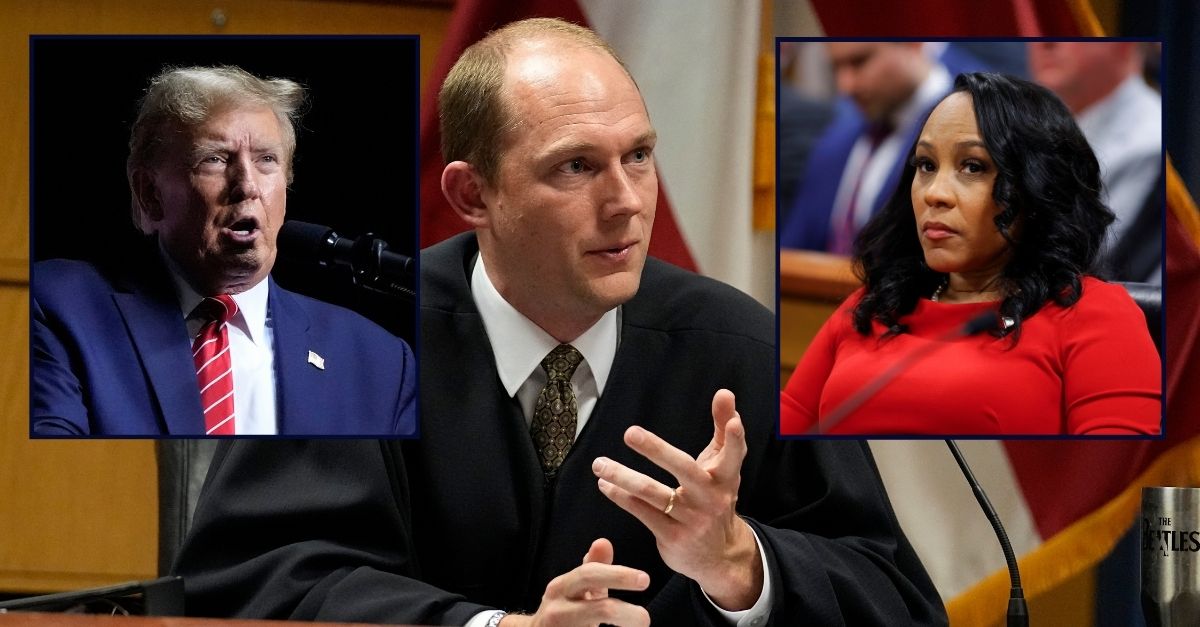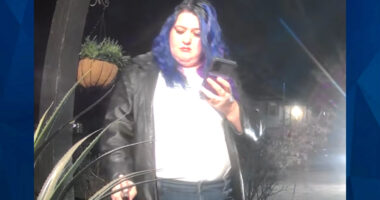Share this @internewscast.com

Main image: Fulton County Superior Judge Scott McAfee speaks in court. (AP Photo/Brynn Anderson, Pool); Inset left: Donald Trump speaks in Rome, Ga. (AP Photo/Mike Stewart, File); Inset right: Fulton County District Attorney Fani Willis looks on during a hearing in Atlanta. (AP Photo/Alex Slitz, Pool)
Former President Donald Trump, along with eight co-defendants, on Friday appealed a trial court judge’s recent decision to keep Fulton County District Attorney Fani Willis in charge of the racketeering (RICO) and election subversion case in Georgia.
The defense has been angling to have Willis and her office removed from the case since January — initially over allegations that her romantic relationship with now-former lead prosecutor Nathan Wade created a conflict of interest due to pecuniary motives.
On March 15, Fulton Superior Court Judge Scott McAfee partially granted the defense motion to disqualify but gave the prosecution the choice of which prosecutor had to go. The court’s order was based on a finding that the one-time romance between Willis and Wade resulted in “a significant appearance of impropriety that infects the current structure of the prosecution team.” Wade resigned hours later.
Now, the defendants insist the trial court’s method of separating the legal issues was “plain legal error requiring reversal” — while basing their interlocutory appeal on the factual record McAfee established.
In the case, Trump and his alleged co-conspirators are charged over numerous actions taken in the aftermath of the 2020 election — including the fake or “contingent” electors scheme, directions to declare the election “corrupt,” and instructions to halt the counting of electoral votes.
The original crux of the defense’s basic argument for removing Willis was that the district attorney hired her then-boyfriend for the job, overpaid him, and then reaped something akin to a financial windfall in the form of vacations, travel, lodging, and other such gifts. Those alleged gifts, the defense argued, were paid for with public funds.
In the end, McAfee said the defense had not met its burden to show Willis obtained “a material financial benefit as a result of her decision to hire” Wade — or that the “financial gain flowing from her relationship” motivated Willis to prosecute and prolong the case.
The appeal application itself is premised on “forensic misconduct” allegations against Willis over her Martin Luther King Jr. Day speech at Big Bethel A.M.E. Church in Atlanta — a speech that, the defense argued, was a direct public response to the nepotism allegations.
“While the trial court factually found DA Willis’ out-of-court statements were improper and Defendants proved an apparent conflict of interest, the trial court erred as a matter of law by not requiring dismissal and DA Willis’ disqualification,” the appeal reads. “This legal error requires the Court’s immediate review.”
The defense has accused the district attorney of using the nationally-televised speech to make “inflammatory extrajudicial racial comments” about the defendants and of improperly stoking “racial animus” to influence would-be jurors in retaliation for, and in order to deflect from, the allegations raised in the motion to disqualify.
McAfee was withering in his prior estimation of this speech.
“The effect of this speech was to cast racial aspersions at an indicted defendant’s decision to file this pretrial motion,” the judge wrote.
The defense says the trial court’s decision not to toss Willis and her office from the case was “legal error” that needs immediate review.
“In that speech, DA Willis, while concealing her personal relationship with SADA Wade, improperly injected race and racial bias into the case, indicating that defendants and their counsel were racists for challenging her unethical conduct,” the appeal reads. “[T]he fact that DA Willis has intentionally and publicly injected race, racial bias, and religion into this case (and any possible jury pool) makes the disqualification of DA Willis and her Office particularly necessary and appropriate.”
Additional forensic misconduct allegations against Willis are spelled out in the 51-page application to the Georgia Court of Appeals.
Again, the defense claims Willis enlarged and exacerbated her problems in response to the initial nepotism allegations raised by co-defendant Michael Roman — but in court, and in court filings, as well.
From the appeal, at length:
The forensic misconduct in this case is not limited to DA Willis’ improper extrajudicial statements evidencing her opinion of the defendants’ guilt, her claims to be ordained by God himself to convict these defendants, or her falsely disparaging Defendants and their counsel as racists … DA Willis engaged in additional — and even more deeply troubling — forensic misconduct. She knowingly filed a false sworn affidavit of former Special Prosecutor Nathan Wade as part of the State’s response to Defendants’ motions, and she lied to the court under oath in her testimony before the trial court.
As Law&Crime previously reported, McAfee expressed a decided amount of frustration with some of the state’s behavior — and strongly intimated that Willis was not truthful when forced to account for her eventually-acknowledged relationship with Wade — but felt that his hands were tied by precedent, or the lack thereof.
A footnote criticizes McAfee for his trepidation:
The trial court stopped short of making a specific finding that DA Willis lied to the court, saying that “the Court is not under an obligation to ferret out every instance of potential dishonesty from each witness or defendant ever presented in open court.” Maybe so. But when the record evidence clearly shows that the DA, who is prosecuting one of the highest profile cases in the country, even arguably gave untruthful testimony under oath in the very case in which her office is prosecuting many of the defendants for allegedly perjuring themselves and making false statements, the need to address this behavior and to disqualify her from further participation in the prosecution is of the highest necessity.
Attorneys for the 45th president implore the appeals court “to correct” the “number of legal errors” in McAfee’s partial dismissal order. And, in another footnote, faults the judge for tying his own hands by issuing seemingly damning facts while ultimately punting.
“The trial court was obviously concerned in its Order about the lack of appellate guidance,” the other footnote reads. “But the absence of precedent involving circumstances similar to those in this case, however, is hardly surprising. No prosecutor has ever been so reckless and relentless in pursuit of personal gain.”
The defense argues the district attorney’s efforts at responding to the original conflict of interest allegations have caused prejudice that cannot be undone so long as she remains on the case.
“[D]ismissal is the truly appropriate remedy because the disqualification of DA Willis and her office cannot fully undo the damage caused to Defendants and their due process rights,” the appeal reads. “But her disqualification is the minimum that must be done to remove the stain of her legally improper and plainly unethical conduct from the remainder of the case.”
The appeal, as its tertiary argument, goes on to fault the trial court for finding that Willis had created “significant appearance of impropriety,” but for not following Peach State law by removing her.
“Nothing in the law — anywhere — says that the remedy for an appearance of impropriety is the disqualification of one apparently conflicted lawyer but not another,” the appeal argues. “Yet that is what the trial court did. If Wade was apparently conflicted and he needed to be disqualified (as the trial court found), then DA Willis necessarily was also conflicted and must be disqualified.”
The appellate court will have 45 days from March 29 to issue an order granting or denying consideration of the defense appeal.
Law&Crime reached out to the district attorney’s office for comment on this story but no response was immediately forthcoming.














